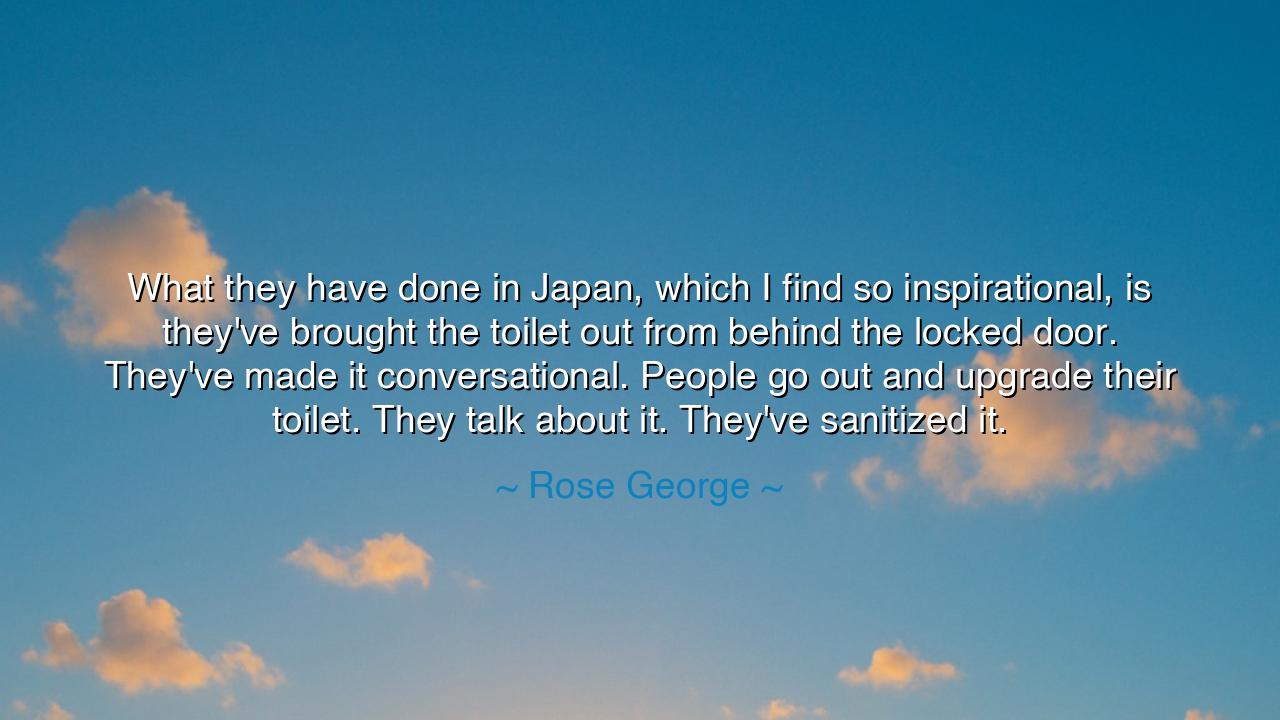
What they have done in Japan, which I find so inspirational, is
What they have done in Japan, which I find so inspirational, is they've brought the toilet out from behind the locked door. They've made it conversational. People go out and upgrade their toilet. They talk about it. They've sanitized it.






In the words of Rose George, author and thinker on the hidden systems that sustain human life, we encounter a truth both humble and profound: “What they have done in Japan, which I find so inspirational, is they’ve brought the toilet out from behind the locked door. They’ve made it conversational. People go out and upgrade their toilet. They talk about it. They’ve sanitized it.” Though her subject may seem mundane, her meaning is anything but. For within this reflection lies a deeper wisdom — that progress begins not only with invention, but with the courage to speak openly of what society hides in silence.
In every civilization, there are things both sacred and shameful — topics veiled by taboo, unspoken though they shape our daily lives. The toilet, symbol of cleanliness and necessity, has long been one such thing. To mention it was considered crude; to improve it, unworthy of intellectual pursuit. Yet in Japan, as George observes, this barrier was broken. The ordinary was transformed into the honorable, and what was once hidden became a symbol of innovation, dignity, and respect for life itself. The Japanese, through their reverence for precision and beauty, elevated even the humblest corner of the home into a space of comfort and care.
The phrase “brought the toilet out from behind the locked door” is more than metaphor. It is the liberation of a necessary truth — that human health and decency depend on open conversation. For to hide what is natural is to invite suffering. Across much of the world, billions live without sanitation, bound by the chains of stigma that forbid discussion of waste and hygiene. In this silence, disease festers, and dignity is denied. But Japan’s example, as George calls inspirational, reminds us that change begins when shame is replaced by honesty, and necessity by design.
History, too, bears witness to this transformation. The ancient Romans, though living centuries ago, understood that sanitation was the foundation of civilization. They built aqueducts and public baths, not merely for pleasure, but for the health of the people. They did not hide their systems; they celebrated them. The Cloaca Maxima, Rome’s great sewer, was not a mark of filth but of pride — a monument to collective welfare. In this, the Romans shared the spirit that modern Japan revives: the wisdom that cleanliness is not a private virtue, but a public good.
Rose George’s admiration stems from the Japanese ability to make the unspeakable speakable. By discussing the toilet, they discuss humanity itself — its vulnerability, its needs, and its capacity for empathy. To “make it conversational” is to reclaim our shared reality from the shadows of embarrassment. For what is conversation if not the bridge between ignorance and understanding? When people “talk about it,” as she says, they remove the power of shame and replace it with curiosity and care. In this way, they have truly “sanitized” the topic — not by hiding it, but by illuminating it.
And yet, George’s insight is not limited to sanitation alone. It is a parable for all silenced subjects. Whether it be poverty, mental health, or the fragility of the planet, progress depends upon our willingness to bring the hidden to light, to make the unspoken part of our shared language. Just as Japan reimagined the toilet, so too must humanity reimagine the way it speaks of all that it fears to name. For every silence broken, every taboo dissolved, is a step toward wisdom and compassion.
So, dear listener, let the lesson of Rose George’s words be this: do not fear the ordinary, for it holds the key to transformation. Honor the unseen systems that sustain life. Speak of what others dare not, for silence breeds ignorance, but conversation breeds change. Let us bring more than toilets — let us bring truth itself — out from behind the locked door. Let us, like the people of Japan, make what is necessary also beautiful, what is private also worthy, and what is hidden also holy. For in elevating the humble, we elevate ourselves — and the mark of true civilization is not what we hide, but what we have the courage to discuss and improve.






AAdministratorAdministrator
Welcome, honored guests. Please leave a comment, we will respond soon